Salvador de Bahia’s 560-mile long coastline interspersed with coconut palms, peaceful fishing villages, and urban beaches lapped by turquoise water, offers a diverse seaside Nirvana for holidaymakers. To the south of this Afro-Brazilian city is Porto da Barra, Farol da Barra, and Praia do Forte, while to the east lies Playa de Pitube, Praia Piata, and Playa de Itapuã - some of the best beaches in tropical Salvador de Bahia.
Session Expired
Your session has expired. Please log in again
Reservation by telephone. Manage your booking with Palladium
Are you calling from outside Spain?
See all phonesHotels
How is your ideal hotel?
Unmatched destinations
-
Brazil
- Bahía
-
Dominican Republic
- Cap Cana
- Punta Cana
- Santo Domingo
-
Italy
- Sicilia - Campofelice di Roccella
-
Jamaica
- Jamaica - Montego Bay
-
Mexico
- Costa Mujeres – Cancún
- Riviera Maya
- Riviera Nayarit
-
Spain
- Ibiza
- Madrid
- Malaga
- Minorca
- Sevilla
- Tenerife
- Valencia
-
United States
- New York
Hotels
How is your ideal hotel?
Unmatched destinations
-
Brazil
- Bahía
-
Dominican Republic
- Cap Cana
- Punta Cana
- Santo Domingo
-
Italy
- Sicilia - Campofelice di Roccella
-
Jamaica
- Jamaica - Montego Bay
-
Mexico
- Costa Mujeres – Cancún
- Riviera Maya
- Riviera Nayarit
-
Spain
- Ibiza
- Madrid
- Malaga
- Minorca
- Sevilla
- Tenerife
- Valencia
-
United States
- New York
Nuestros hoteles son más que hoteles
Nuestros hoteles son más que hoteles
-
0 800 102 61 91UK Free
-
0 800 000 4657Germany Free
-
800 141 734Italy Free
-
0034 971 92 64 86Other countries Europe
-
800 990 1234Mexico Free
-
1 888 660 90 70USA Free
-
1 866 778 9077Canada Free
-
0052 984 873 48 25Other countries
-
1 849 937 08 17Dominican Republic Free
-
+55 7 140 40 41 15Brazil
-
0800 3458102Argentina Free
-
800 914591Chile Free
-
01800 5184354Colombia Free
-
+1 844 411 00 77Jamaica Free
HOTEL OR DESTINATION
Select Destination
CHECK-IN / CHECK-OUT
Select dates
Guests
2 Adults
Promotional Code
Search
Leisure and Culture
-
WHAT ARE THE BEST BEACHES IN SALVADOR DE BAHIA?
-
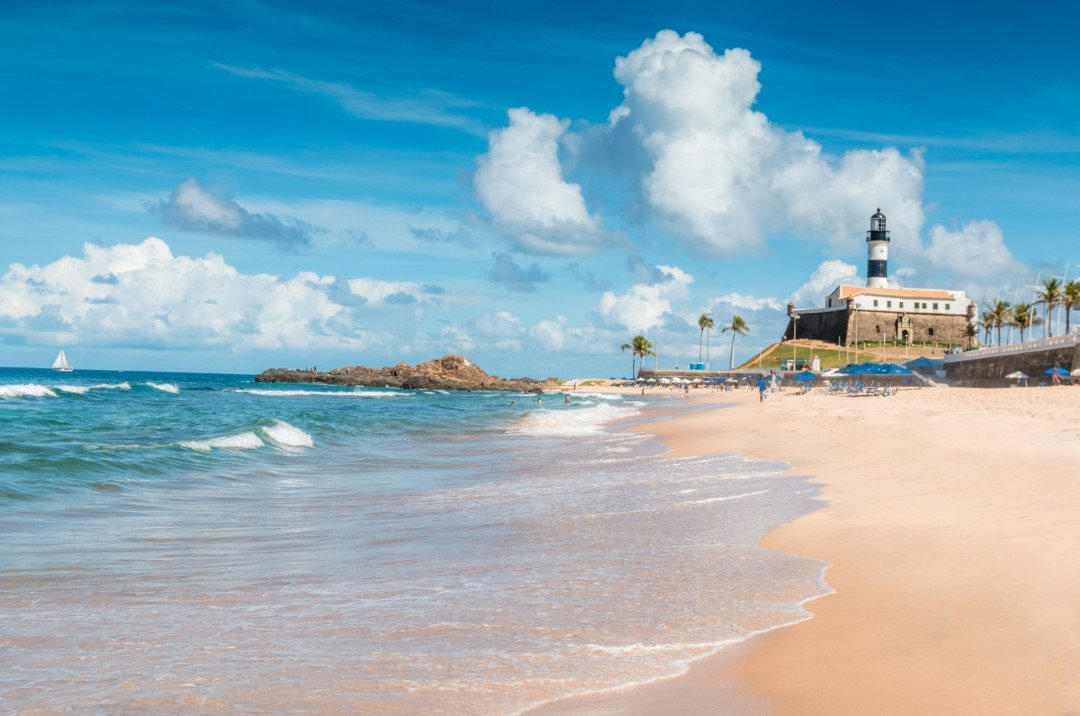 PRAIA DO PORTO DA BARRA
PRAIA DO PORTO DA BARRAThis crescent-shaped beach, with a colonial fort at one end and a church at the other, often has mild, aquamarine waves and a refreshing sea breeze making it an all-time favorite for swimming and water sports. For beachgoers, there’s plenty of colorful parasols to relax under and enough room to play soccer or volleyball on its golden shore.
-
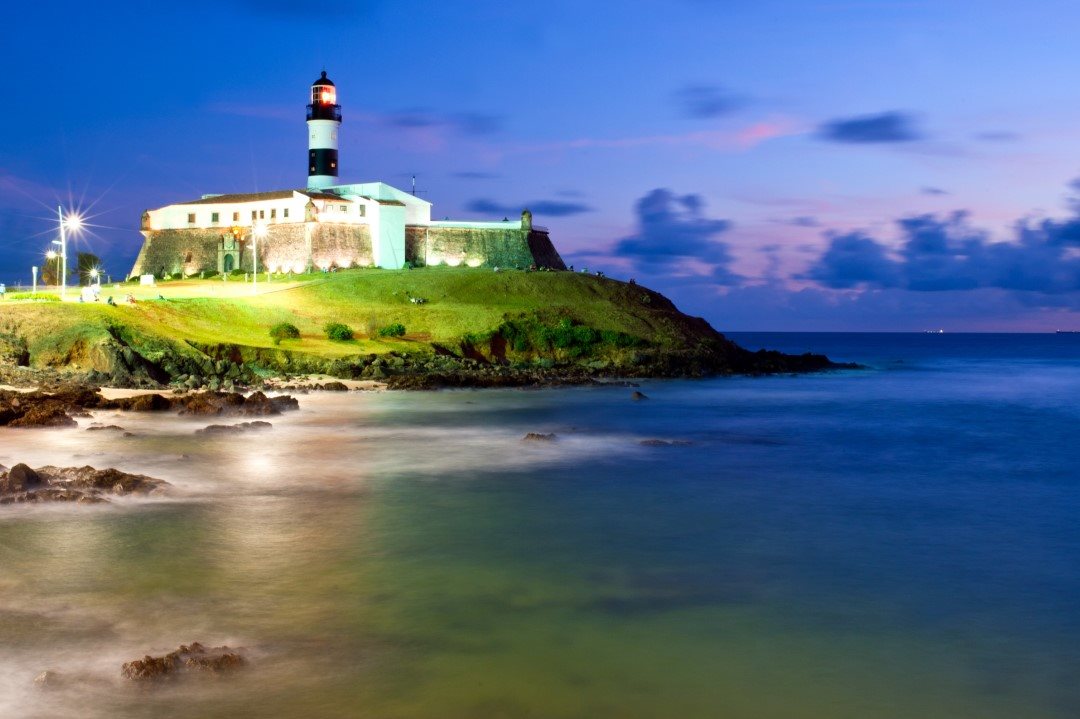 PRAIA DO FAROL DA BARRA
PRAIA DO FAROL DA BARRAFacing Itaparica Island on All Saints Bay and named after a historic lighthouse, Praia do Farol da Barra is a popular shoreline with laid-back holidaymakers, surfers, and divers. There’s dozens of shipwrecks to explore in its crystalline waters, while its unique geography lets beachgoers observe the glistering sunset and sunrise above the horizon.
-
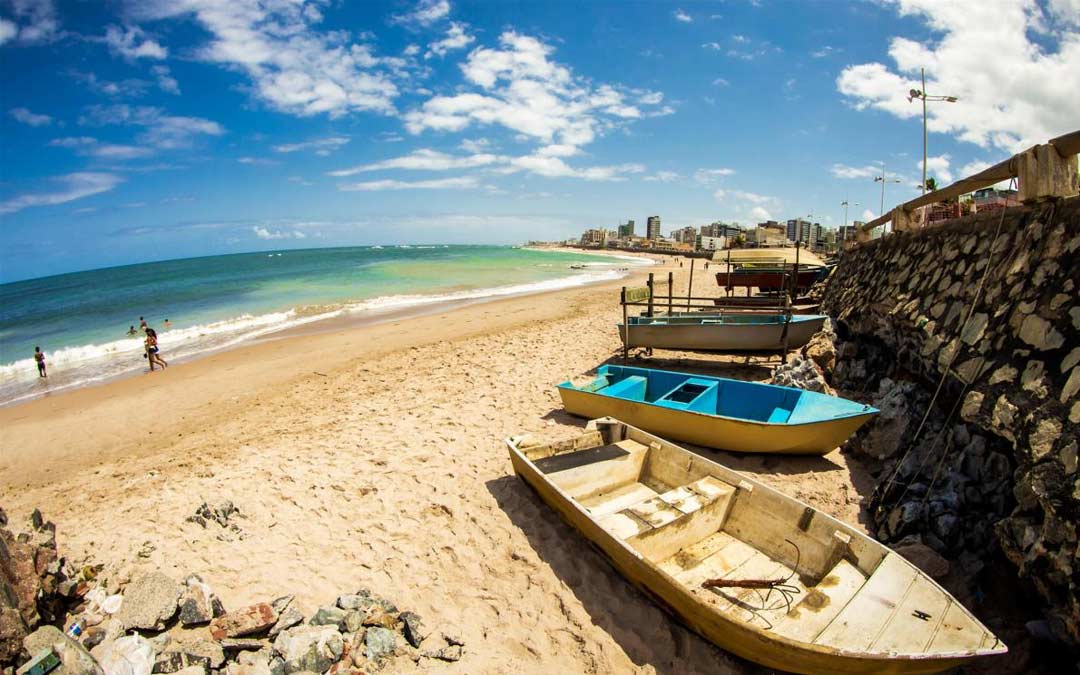 PRAIA DA PITUBA
PRAIA DA PITUBAThis long beach dotted with jangadas - traditional Brazilian fishings boats - is one of the top surfing spots in Salvador de Bahia. Just over 6 miles north of the city center, it’s a worthwhile visit for experienced surfers, who can navigate moderate Atlantic waves.
-
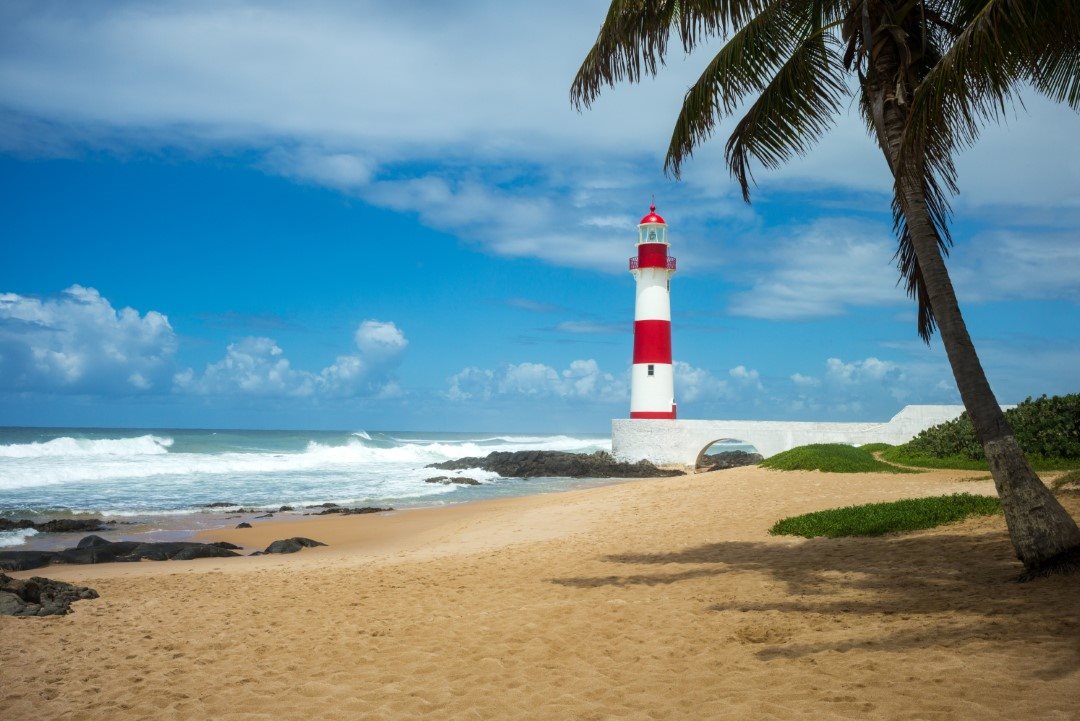 PRAIA DE ITAPUÃ
PRAIA DE ITAPUÃNamed “snoring rock” by the Tupi Indians due to the sound of the waves crashing against rocks at low tide, Praia de Itapuã has tranquil waters surrounded by reefs keeping the waves small and the swell peaceful. Ringed with palm trees and ideal for easy bathing, it's a favorite relaxation spot amongst locals and tourists alike.
-
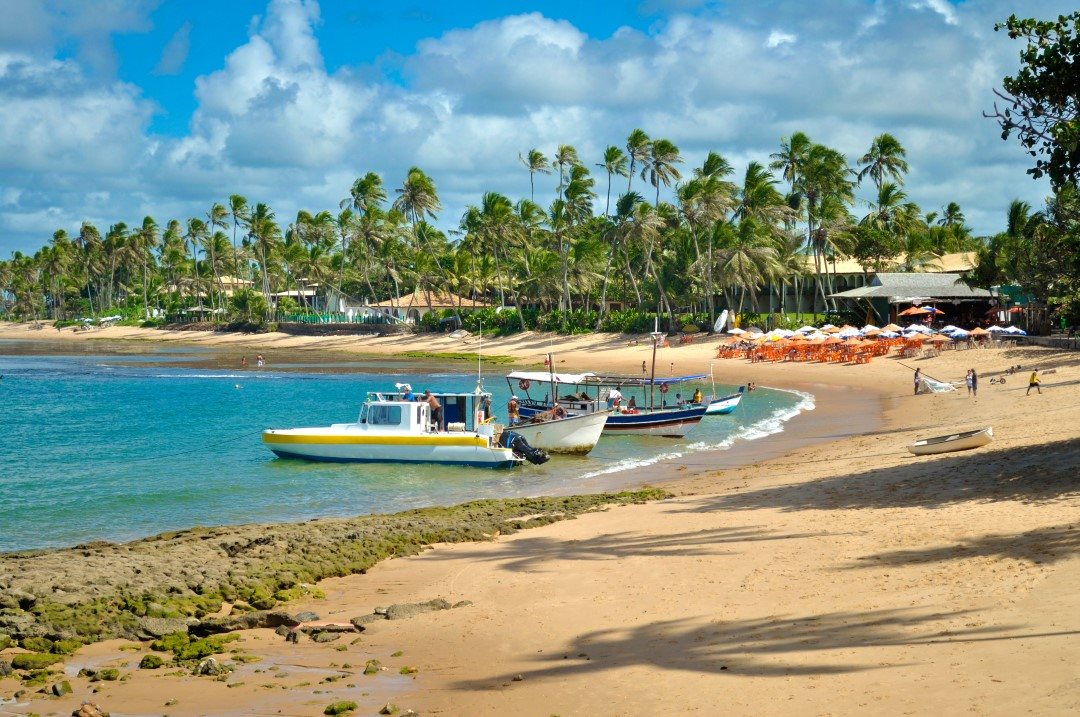 PRAIA DO FORTE
PRAIA DO FORTEWith six miles of fluffy white sand and colorful boats bobbing in clean, clear water, it’s no wonder locals call Praia do Forte the “Brazilian Polynesia.” When the tide is low, its offshore reefs transform into natural swimming pools befitting for swimming and snorkeling. It’s also the location of the country’s most extensive endangered sea turtle protection program, Project Tamar, making it one the most beautiful and best beaches in Salvador de Bahia.
-
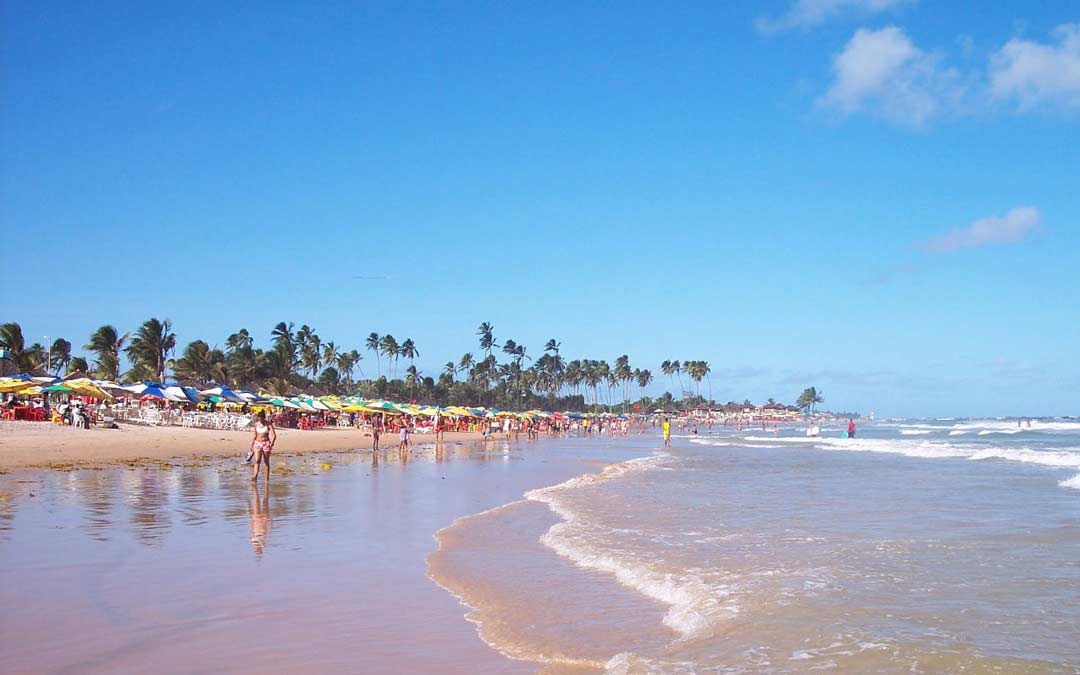 PRAIA PIATA
PRAIA PIATA12 miles east of Salvador de Bahia lies Praia Piata, a broad beach with hard-packed sand and large, swaying coconut trees. It’s serene, blue-green waters and a gentle gradient make it a family-friendly swimming destination. Many enjoy cycling and walking along its promenade or playing volleyball and soccer on its golden sand during low-tide.
- Don’t swim if a red flag is flying. In specific areas, Salvador de Bahia’s beaches have strong, dangerous currents.
- Drink purified water to avoid contracting water-borne diseases.
- When shopping in Salvador de Bahia, carry a fair amount of 10 and 20 Reals banknotes. This makes it easier for small vendors and stalls to provide you with change.
- To avoid theft, only take a small bag with absolute necessities and leave valuables at your accommodation
- Wash hands or clean them with sanitizer before eating to kill germs.
- Bargaining is practiced widely at local markets, but it's up to the buyer to begin negotiations.
- Contrary to popular belief, only designated beaches allow topless women.
- Drink alcohol in moderation and stay dehydrated, especially when in the sun.
- Always look around before purchasing to find out the average price of goods before buying.
- Using beach towels is a no-go for Brazilians, rather opt for sarongs called cangas.
- Stay away from shellfish, fruit, and vegetables that have been left in the open.
- When in street markets, always keep a firm eye on your belongings and use discretion when dealing with banknotes so as not to attract the attention of petty thieves.
- Don’t take food to the beach
- Always wash and peel fresh fruit and vegetables before eating.
- When visiting busy city markets, don’t walk around with expensive-looking jewelry.
- Don’t eat unpasteurized dairy products
- Use ATMs inside banks, rather than freestanding machines which are more susceptible to fraud.
-
-
WHAT ARE THE BEST EXCURSIONS IN SALVADOR DE BAHIA?
Founded in 1594 by the Portuguese, Salvador de Bahia was once a major South American slave trade port. The city’s elaborate 17th and 18th-century architecture and contemporary Afro-Brazilian culture reflect its colonial history, while its surrounding landscape boasts enormous beauty filled with palm-lined beaches and wondrous rainforests. Booking a Salvador de Bahia historical and cultural tour, cruising to the scenic Morro de São Paulo, learning about endangered sea turtles at Praia do Forte, island-hopping in Baía de Todos os Santos, visiting the ancient, colonial town Cachoeira or riding over dunes in Mangue Seco are some of the best 1-day excursions in Salvador de Bahia.
-
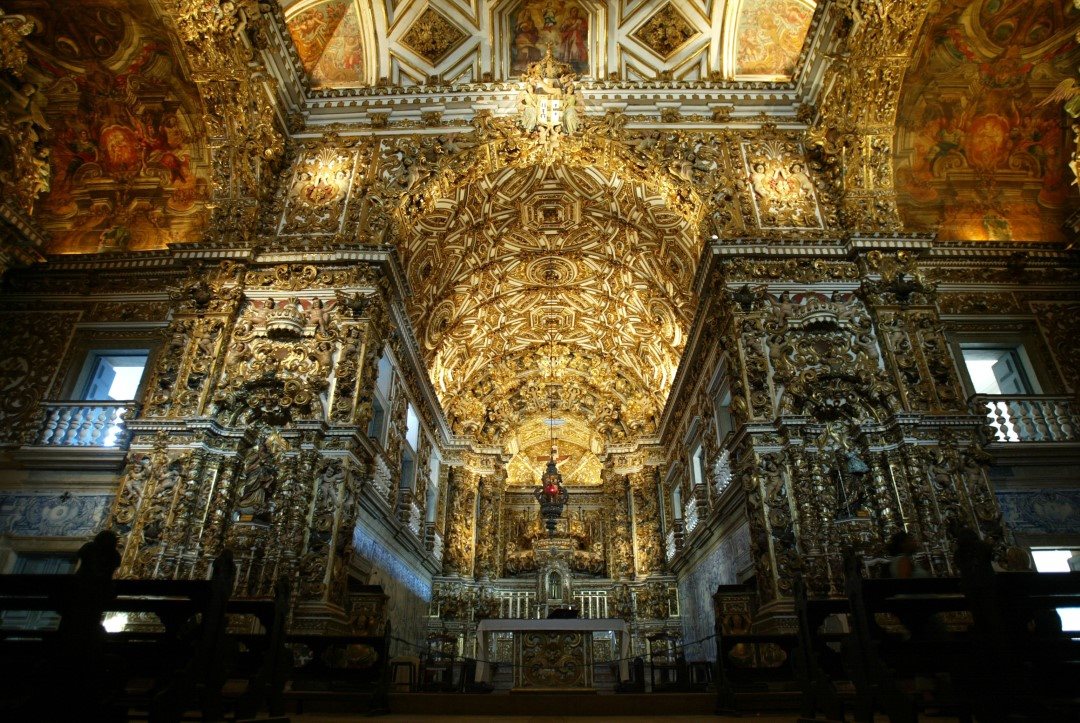 SALVADOR DE BAHIA HISTORICAL AND CULTURAL TOUR
SALVADOR DE BAHIA HISTORICAL AND CULTURAL TOURTravel back in time exploring the Pelourinho neighborhood, a UNESCO-declared World Heritage Site, with colorful Portuguese colonial architecture and cobblestone streets. Since the 16th century, the city has built more than a thousand monuments, houses and churches, giving it the largest Baroque architecture heritage in Latin America. Head to the Afro-Brazilian Museum to learn about Salvador de Bahai's multicultural history, and visit the ornate São Francisco Church and Convent by going on a guided tour to see all of Salvador de Bahia’s rich, historical splendor.
-
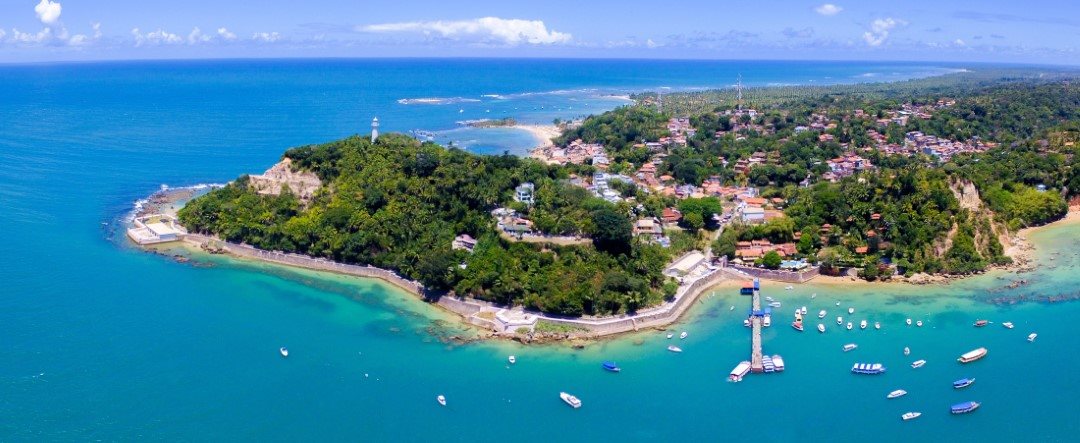 MORRO DE SÃO PAULO
MORRO DE SÃO PAULO37 miles south of Salvador de Bahia and only accessible by boat or plane, this car-less village is one of five on Tinharé Island and one of the best day trips from Salvador de Bahia. Relax under the palms at Primeira Praia, walk along the town’s archaeological trail and pass the 17th-century ruins of the Fortress of Tapirandu, while spotting dolphins off-shore or book a 4x4 expedition tour its inland rainforest.
-
 PRAIA DO FORTE DAY TRIP
PRAIA DO FORTE DAY TRIPFamous for its lush forests, natural pools, and preservation efforts, Praia do Forte is a picturesque seaside town with golden beach sand and crystalline waters, ideal for a laid-back day by the seaside. Those interested in conservation will enjoy a visit to the Tamar Project’s sea turtles. Founded in the 1980s and dedicated to preserving these endangered sea creatures, the Tamar Project is recognised as one of the most successful conservation initiatives in the world.
-
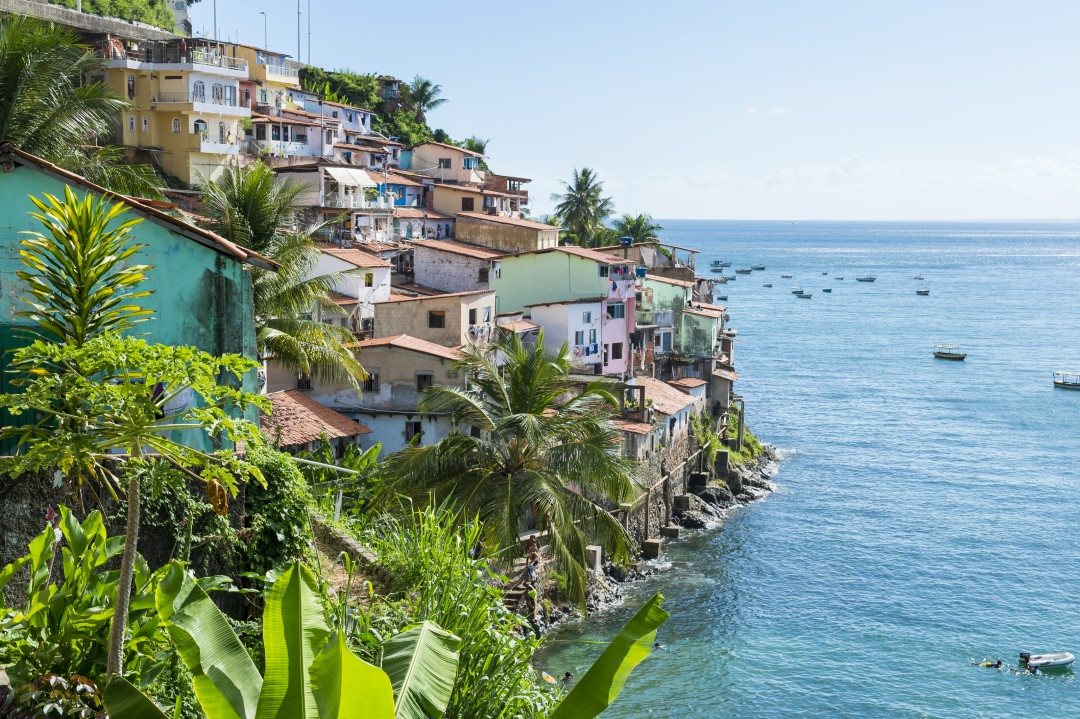 BAÍA DE TODOS OS SANTOS
BAÍA DE TODOS OS SANTOS -
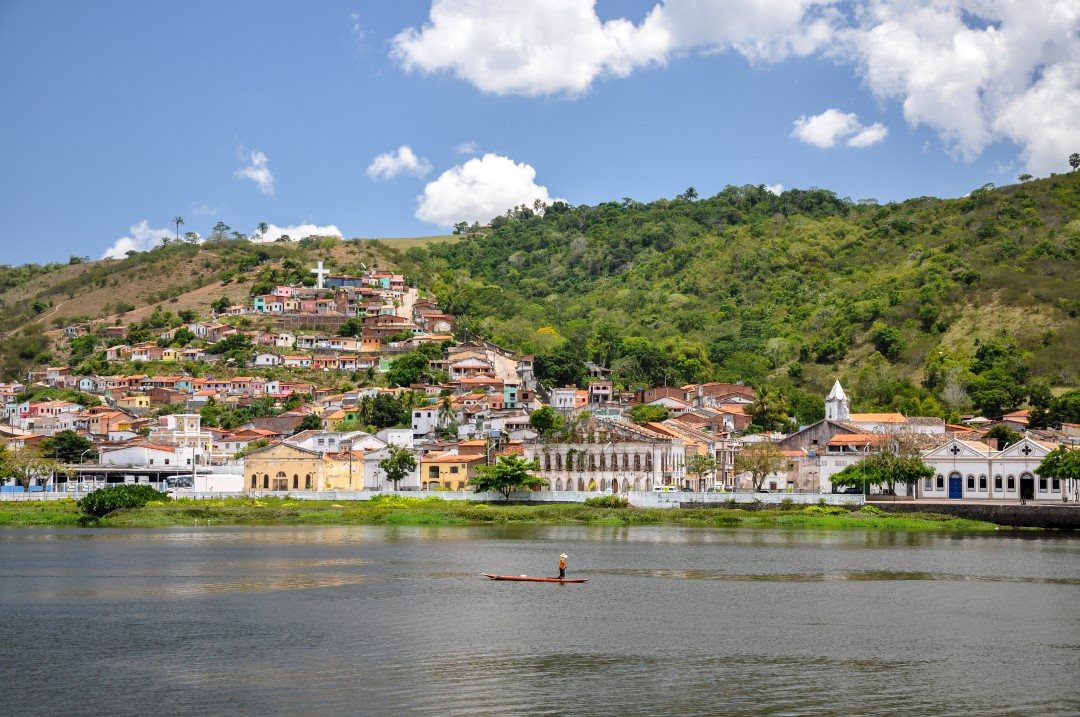 CACHOEIRA
CACHOEIRALike Salvador, Cachoeira is a melting pot of Afro-Brazilian culture and was once the first European agricultural area in region. This colonial town, whose historic center is a national monument, dates back to the 16th century. Walk down its old streets and behold its magnificent Baroque architecture, including the Igreja Matriz and Ordem Terceira churches, as well as temples from Candomblé, a polytheistic religion with West African roots that originated and is still practiced in Salvador de Bahia.
-
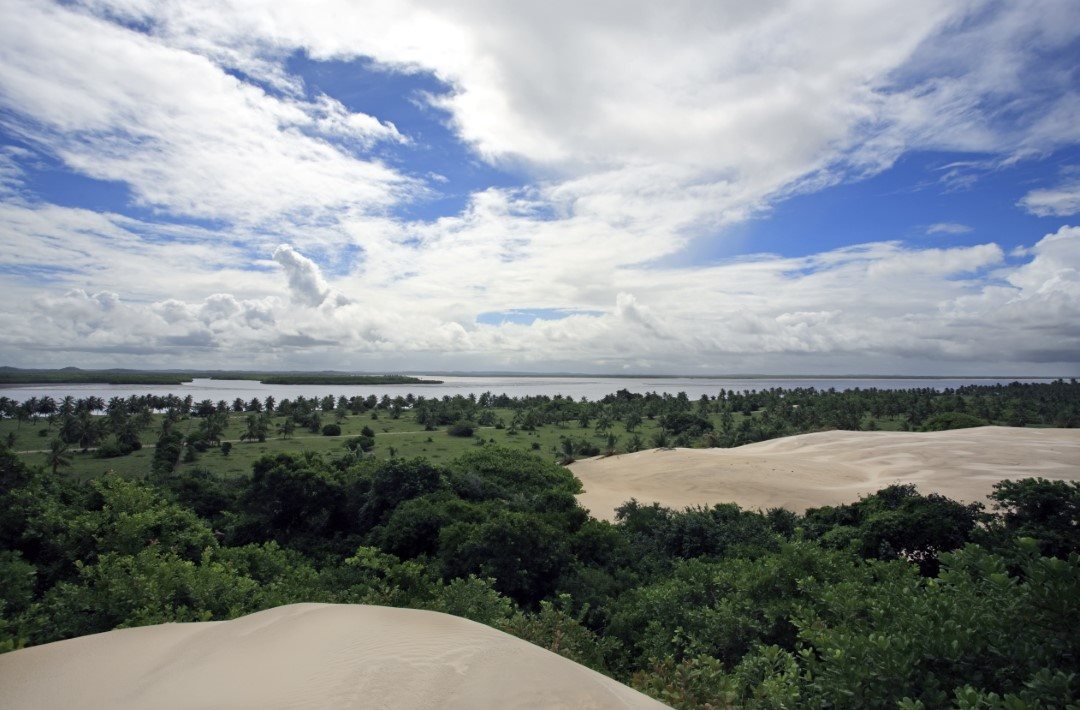 MANGUE SECO
MANGUE SECOLocated at the tip of a peninsula formed by the Rio Real on Bahia’s border and only accessible by canoe, this isolated village is popular for its adventurous dune driving tours. Afterwards, visitors can relax on remote stretches of beach or climb to the top of the small town’s lighthouse for a panoramic view of the Atlantic Ocean.
- Don’t swim if a red flag is flying. In specific areas, Salvador de Bahia’s beaches have strong, dangerous currents.
- Drink purified water to avoid contracting water-borne diseases.
- When shopping in Salvador de Bahia, carry a fair amount of 10 and 20 Reals banknotes. This makes it easier for small vendors and stalls to provide you with change.
- To avoid theft, only take a small bag with absolute necessities and leave valuables at your accommodation
- Wash hands or clean them with sanitizer before eating to kill germs.
- Bargaining is practiced widely at local markets, but it's up to the buyer to begin negotiations.
- Contrary to popular belief, only designated beaches allow topless women.
- Drink alcohol in moderation and stay dehydrated, especially when in the sun.
- Always look around before purchasing to find out the average price of goods before buying.
- Using beach towels is a no-go for Brazilians, rather opt for sarongs called cangas.
- Stay away from shellfish, fruit, and vegetables that have been left in the open.
- When in street markets, always keep a firm eye on your belongings and use discretion when dealing with banknotes so as not to attract the attention of petty thieves.
- Don’t take food to the beach
- Always wash and peel fresh fruit and vegetables before eating.
- When visiting busy city markets, don’t walk around with expensive-looking jewelry.
- Don’t eat unpasteurized dairy products
- Use ATMs inside banks, rather than freestanding machines which are more susceptible to fraud.
-
-
WHERE TO HAVE FUN IN SALVADOR DE BAHIA
As the oldest metropolis in the country and thought to be Latin America's most African city, Salvador de Bahia exudes an intoxicating energy with its fervent festivals, percussive music and eclectic mix of laid-back bars and and pulsating clubs. Its impromptu celebrations, moving blocos sounding out African rhythms on their drums, capoeira circles practising on street corners and outdoor parties lasting till early morning, provide a nightlife experience unique to this dynamic Afro-Brazilian city. Want to know where to have fun in Salvador de Bahia? Try bar-hopping in historic Pelourinho, drinking sundowners at Baía de Todos os Santos, salsa dancing in bohemian Rio Vermelho, listening to bossa nova beats at the art museum, going to the theatre or witnessing the incredible Bahian Carnival.
-
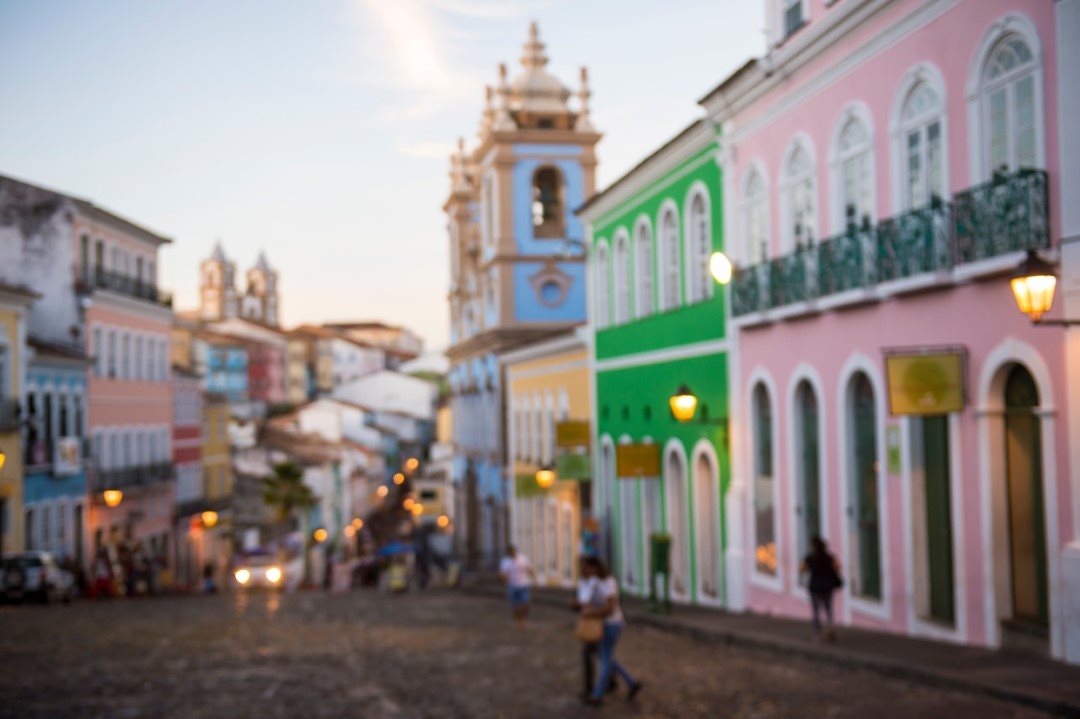 BAR HOP IN PELOURINHO
BAR HOP IN PELOURINHOIn Salvador de Bahia Tuesdays and Fridays are assigned party nights. Downtown in the historic heart of the city live music fills the air, people dance in the streets or enjoy caipirinhas and beers in the many characterful bars and cafes. Be sure to catch the bloco do Olodum, Salvador de Bahia's famous street band, performing samba-reggae on designated routes throughout the city.
-
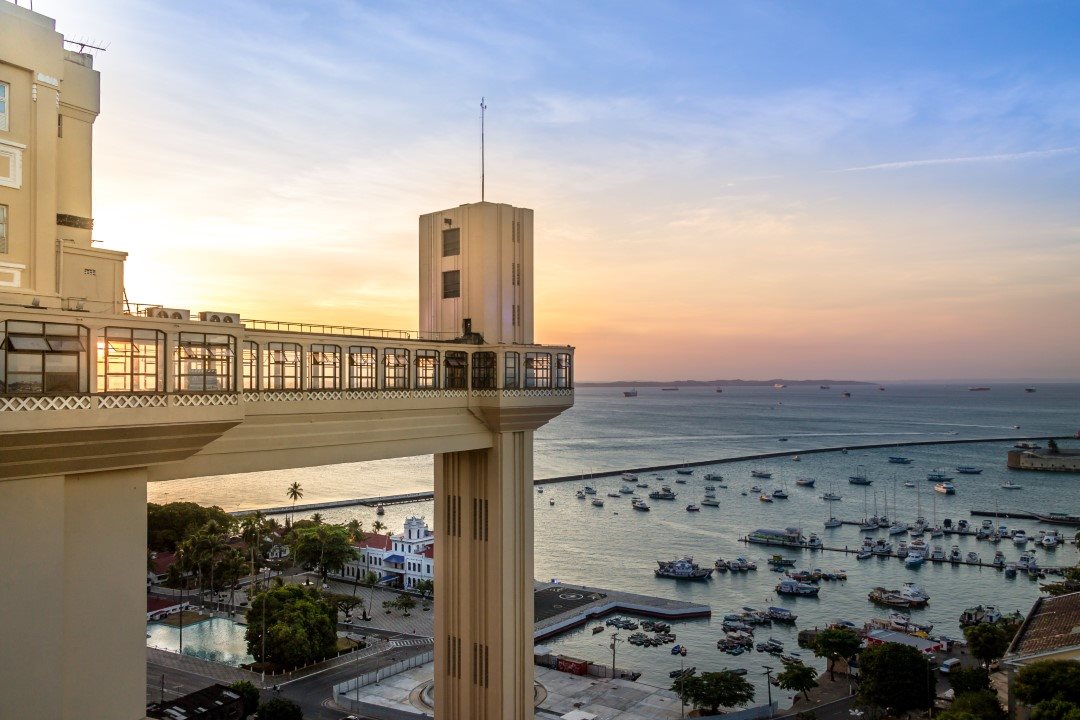 HAVE SUNDOWNERS AT BAÍA DE TODOS OS SANTOS
HAVE SUNDOWNERS AT BAÍA DE TODOS OS SANTOSSunsets at this scenic bay are best appreciated with “fazer um esquenta” - early drinks, as the locals like to call it. After a long day exploring Salvador de Bahia, sit back, relax and watch the lights of anchored ships twinkling on the vast ocean before heading to Rio Vermelho, a well-known bohemian district to dance to Afro-Brazilian beats.
-
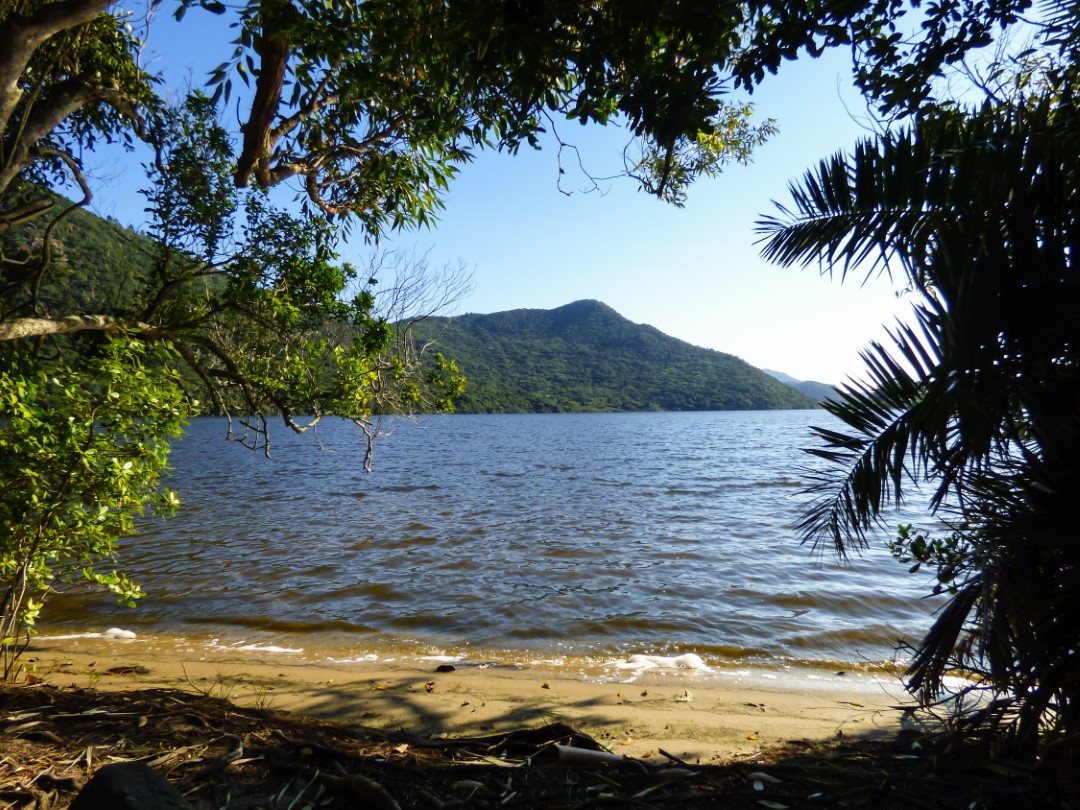 SPEND A NIGHT IN RIO VERMELHO
SPEND A NIGHT IN RIO VERMELHOKnown for its thriving art scene, Rio Vermelho is in the city’s southern zone and bustles with 24/7 activity. As a burgeoning salsa and samba dance spot, it's a great place to learn the dance style, as well as the neighborhood to watch spiritual dances of the Candomblé; the animist religion initially brought to Brazil by West African slaves. In addition, Mercado do Peixie, a 24-hour market, is perfect for partygoers to grab a dinner before heading out or for breakfast when returning from a night on the town.
-
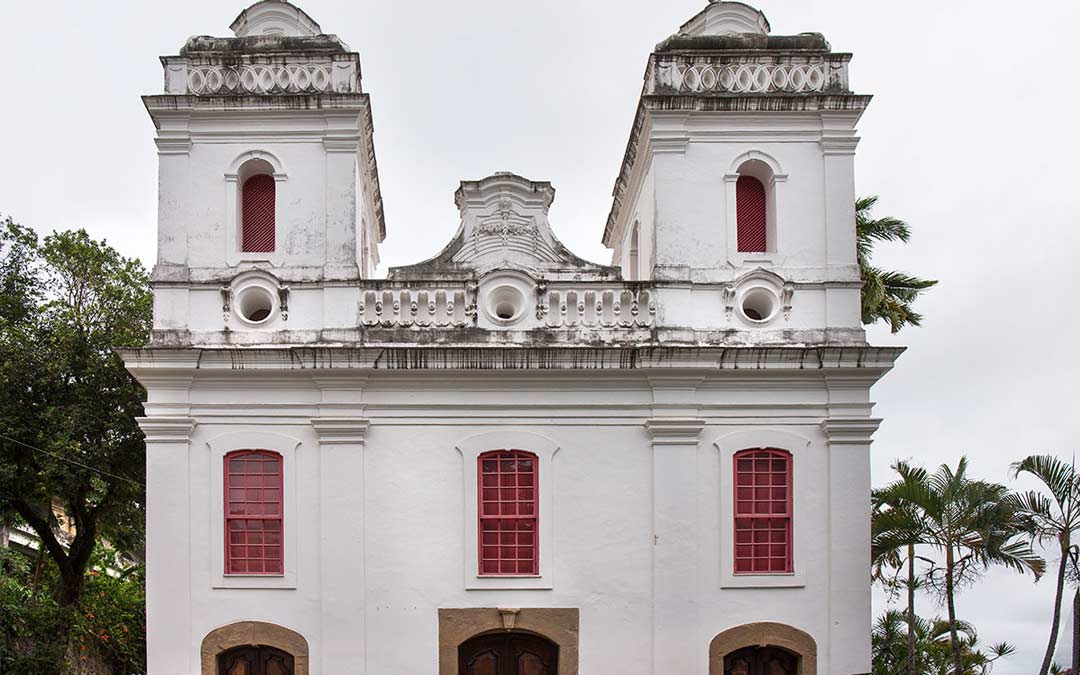 LISTEN TO LIVE MUSIC AT MUSEU DU ARTE MODERNA
LISTEN TO LIVE MUSIC AT MUSEU DU ARTE MODERNAOn Saturday nights, Bahia’s art museum, within walking distance from Pelourinho, hosts incredible live music jam sessions. Go early to get a seat and take advantage of its open-air space by listening to blues, bossa nova, and jazz rhythms as the sun sets.
-
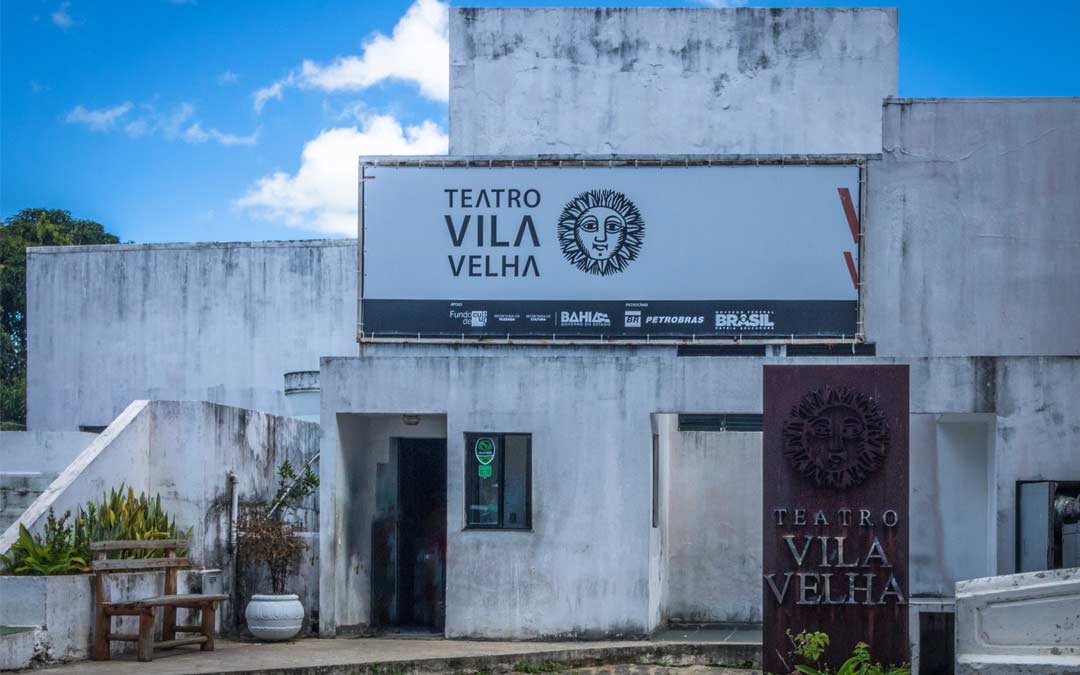 WATCH THEATRE AT TEATRO VILA VELHA
WATCH THEATRE AT TEATRO VILA VELHAFounded in 1964 and one of the most important theatres located in the city center, Teatro Vila Velha offers an inspiring variety of performances ranging from dance to drama to live music acts and cabaret. Throughout the year, its four resident theatre groups stage exciting works exploring Afro-Brazilian heritage.
-
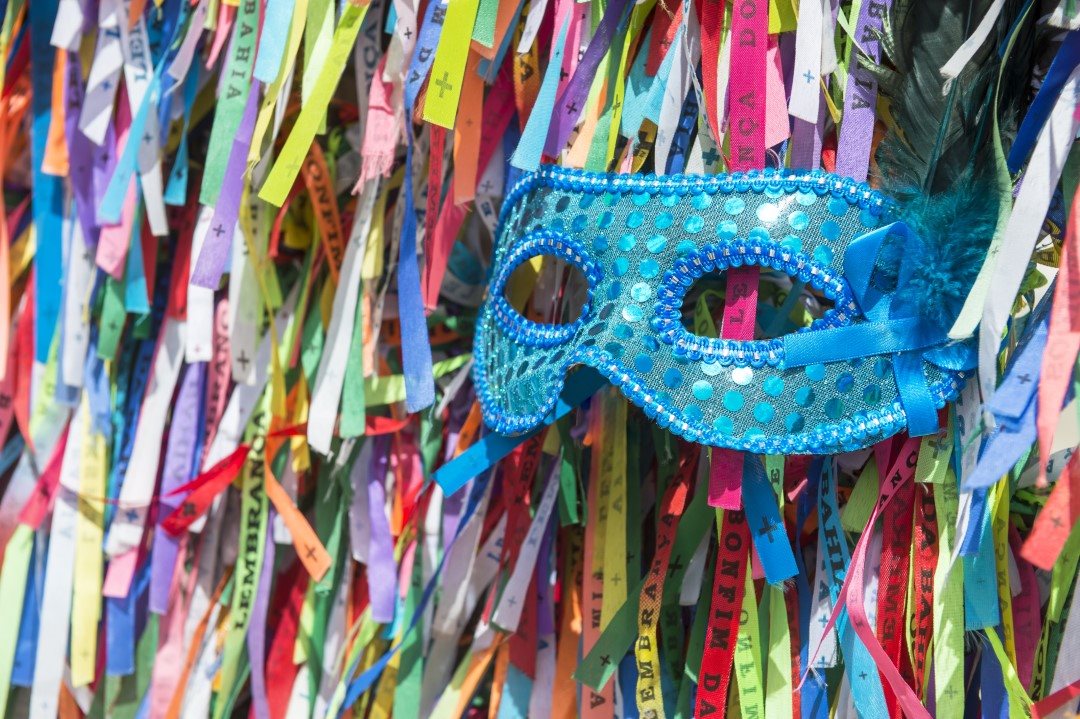 THE SPECTACULAR BAHIAN CARNIVAL
THE SPECTACULAR BAHIAN CARNIVALThe annual Bahian Carnival takes over Salvador de Bahia capturing the spirit of the city and its people with festive flotillas and energetic blocos. Trio electrico bands sing and dance atop motorised floats until early morning hours, while crowds party in the street or view the spectacle from afar. Its expression of folklore, Afro-Brazilian beats, and glittering parade costumes are a once-in-lifetime experience for the whole family that’s not to be missed if visiting during this time of year.
- Don’t swim if a red flag is flying. In specific areas, Salvador de Bahia’s beaches have strong, dangerous currents.
- Drink purified water to avoid contracting water-borne diseases.
- When shopping in Salvador de Bahia, carry a fair amount of 10 and 20 Reals banknotes. This makes it easier for small vendors and stalls to provide you with change.
- To avoid theft, only take a small bag with absolute necessities and leave valuables at your accommodation
- Wash hands or clean them with sanitizer before eating to kill germs.
- Bargaining is practiced widely at local markets, but it's up to the buyer to begin negotiations.
- Contrary to popular belief, only designated beaches allow topless women.
- Drink alcohol in moderation and stay dehydrated, especially when in the sun.
- Always look around before purchasing to find out the average price of goods before buying.
- Using beach towels is a no-go for Brazilians, rather opt for sarongs called cangas.
- Stay away from shellfish, fruit, and vegetables that have been left in the open.
- When in street markets, always keep a firm eye on your belongings and use discretion when dealing with banknotes so as not to attract the attention of petty thieves.
- Don’t take food to the beach
- Always wash and peel fresh fruit and vegetables before eating.
- When visiting busy city markets, don’t walk around with expensive-looking jewelry.
- Don’t eat unpasteurized dairy products
- Use ATMs inside banks, rather than freestanding machines which are more susceptible to fraud.
-
-
WHAT TO EAT IN SALVADOR DE BAHIA
Salvador de Bahia’s gastronomy is an assimilation of West African, Portuguese and Amerindian flavors. The Portuguese settlers introduced meats, olive oil, and sugary desserts into the Amerindian staple diet of maize and cassava (a woody shrub). However, it was the West African slaves who truly transformed the region’s cuisine with spices such as coriander, cloves, and peppers, as well as palm oil, referred to as azeite de dendê. Most Bahian dishes contain rice and feijoada (black beans) flavored by chili peppers, coconut milk, quiabo (a green pod vegetable) and ginger. As a coastal city, seafood such as shrimp, cod, and sardines are also found in favorite meals such as the fish stew specialty moqueca. The bedrock of Bahian cuisine is palm oil and pepper, giving typical dishes a yellow-reddish color and hot, peppery taste. Cassava flour called gari is also used in many side dishes served with stew and soups. From wholesome meals such as moqueca and acarajé prepared in gourmet restaurants to sweet treats like cocada sold by street vendors, there’s no shortage of Afro-Brazilian cuisine to try when it comes to deciding what to eat in Salvador de Bahia. Here’s a brief guide to the city’s specialties, as well as some dining dos and don'ts.
-
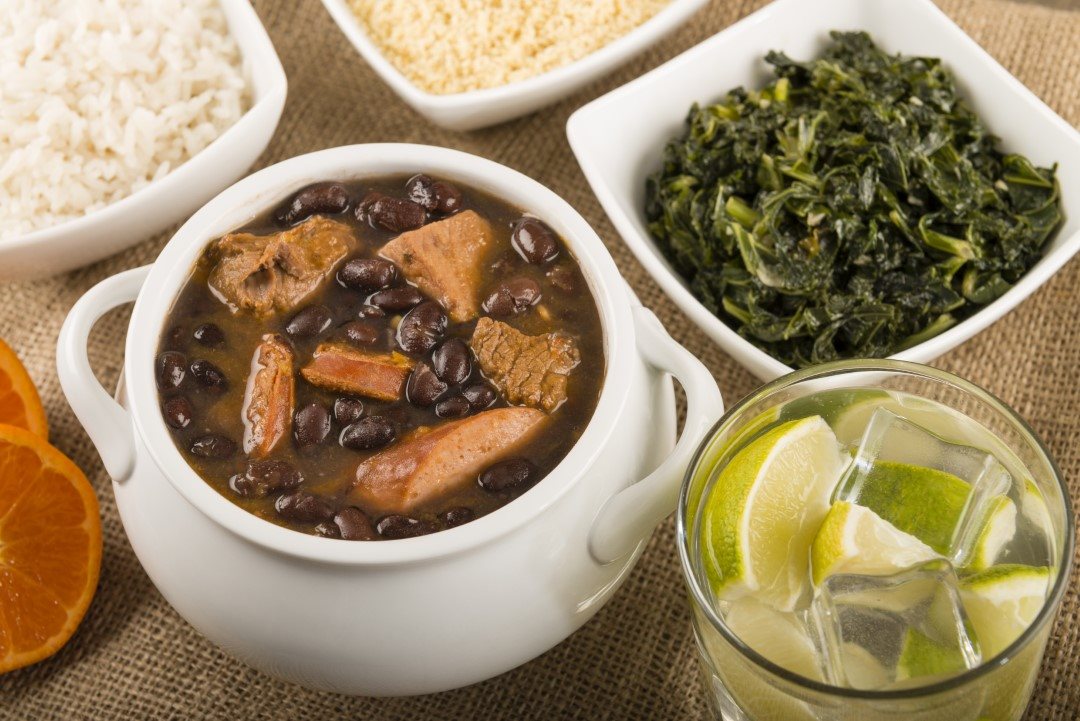 THE BEST TRADITIONAL FOOD FROM SALVADOR DE BAHIA
THE BEST TRADITIONAL FOOD FROM SALVADOR DE BAHIAMoqueca, the shrimp-based seafood stew is a must-try. Made with fish, tomatoes, onions, garlic, and coriander slowly cooked in a terracotta dish and sauteed over a low flame, this 300-year-old meal is served over rice cooked in coconut milk, giving it a rich, creamy taste. Acarajé, made from mashed fradinho beans and ground shrimp, onion, and peppers, is a deep-fried, street food delight. Often had as a snack between meals with a cold beer, it's commonly found at food markets and beachfront bars. Those with an appetite might want to try vatapá, a stew made from bread, coconut milk, shrimp, peanuts and palm oil. Feijoada, a Portuguese-style stew of black beans and pork, is also a specialty, served mainly on special occasions. For snacking, there’s tapioca, a type of thin pancake made with starch extracts from cassava plants, stuffed with fruit, cheese or bathed in condensed milk. Inexpensive cocadas - a sugary coconut-like fudge - also make for a delicious treat.
-
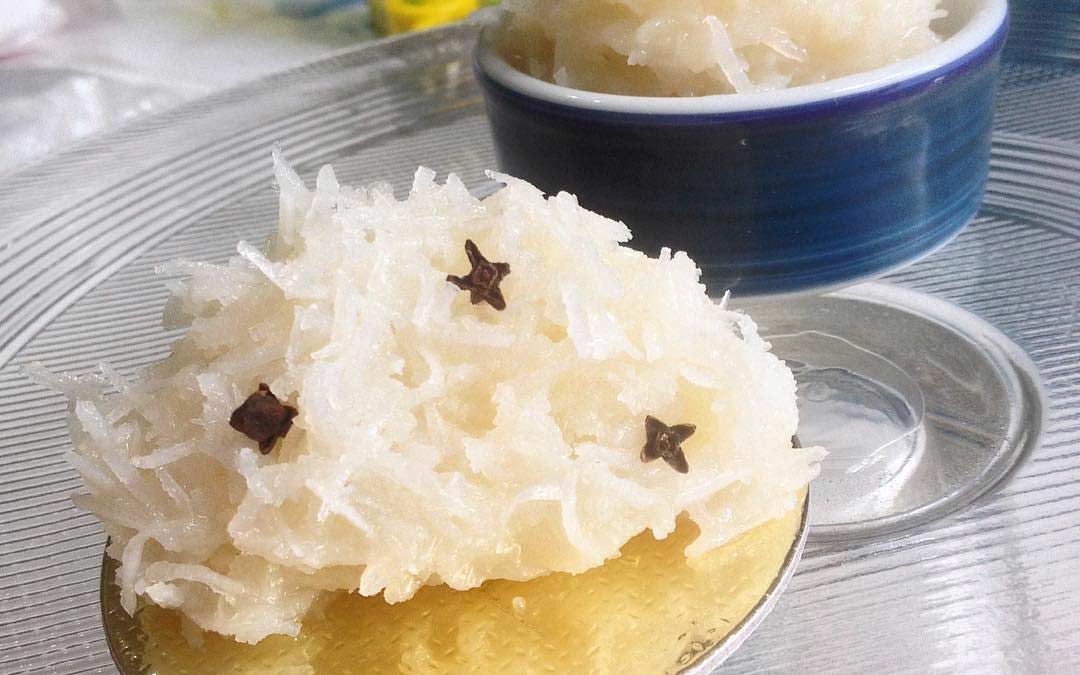 HOW TO MAKE COCADA
HOW TO MAKE COCADADissolve 1lb of sugar in a 1 cup of water and boil until the mixture spins a thread. Remove the syrup from the heat and add 1lb of grated coconut. Stir well until the mixture turns sugary. Pour into a greased baking dish and let cool. Cut into small squares, approximately 2 inches.
-
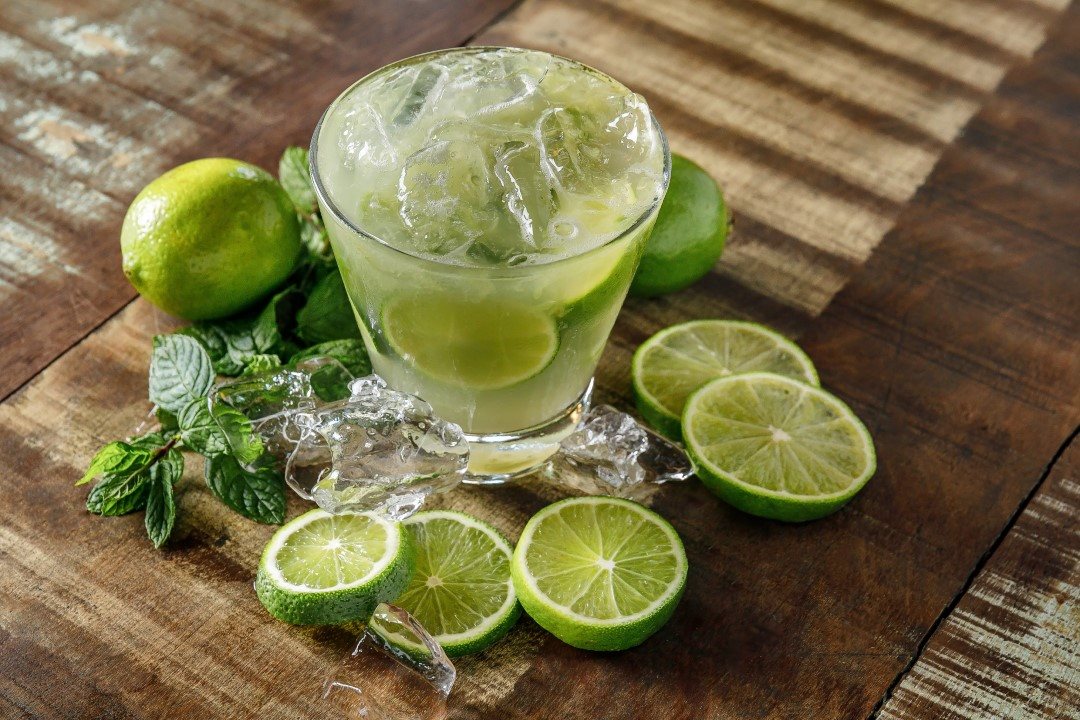 LIQUORS AND DRINKS YOU MUST TASTE IN SALVADOR DE BAHIA
LIQUORS AND DRINKS YOU MUST TASTE IN SALVADOR DE BAHIACachaça is Brazil’s natural distilled spirit made from fermented sugar cane. It can be enjoyed as is or added to a Caipirinha, a refreshing and famous Brazilian cocktail made from strawberry, passionfruit and pineapple juice. Beachgoers will enjoy sipping fresh juice from smooth, green coconuts and trying Guaraná soft drinks. For the health conscious, there’s Vitaminas, tropical fruit smoothies made with milk and fruit.
- Don’t swim if a red flag is flying. In specific areas, Salvador de Bahia’s beaches have strong, dangerous currents.
- Drink purified water to avoid contracting water-borne diseases.
- When shopping in Salvador de Bahia, carry a fair amount of 10 and 20 Reals banknotes. This makes it easier for small vendors and stalls to provide you with change.
- To avoid theft, only take a small bag with absolute necessities and leave valuables at your accommodation
- Wash hands or clean them with sanitizer before eating to kill germs.
- Bargaining is practiced widely at local markets, but it's up to the buyer to begin negotiations.
- Contrary to popular belief, only designated beaches allow topless women.
- Drink alcohol in moderation and stay dehydrated, especially when in the sun.
- Always look around before purchasing to find out the average price of goods before buying.
- Using beach towels is a no-go for Brazilians, rather opt for sarongs called cangas.
- Stay away from shellfish, fruit, and vegetables that have been left in the open.
- When in street markets, always keep a firm eye on your belongings and use discretion when dealing with banknotes so as not to attract the attention of petty thieves.
- Don’t take food to the beach
- Always wash and peel fresh fruit and vegetables before eating.
- When visiting busy city markets, don’t walk around with expensive-looking jewelry.
- Don’t eat unpasteurized dairy products
- Use ATMs inside banks, rather than freestanding machines which are more susceptible to fraud.
-
-
WHAT ARE THE BEST THINGS TO DO IN SALVADOR DE BAHIA?
Salvador de Bahia's cultural and natural landscape is well-suited for history buffs, nature-lovers, and watersport thrill-seekers. Once a New World Colony, the city has a strong cultural legacy with many inspiring nature-filled activities closeby. From the gold-gilded churches in Pelourinho to Todos os Santos Bay, the second largest bay in the world, there are plenty of active tourism activities in Salvador de Bahia. Trying energetic capoeira classes, riding along beaches on horseback, taking a whale watching tour, going on a historical and cultural trip through the city’s architecture delights, boating upriver in Sapiranga Natural Reserve or opting for watersports such as scuba diving and snorkeling, are some of the best activities in Salvador de Bahia.
-
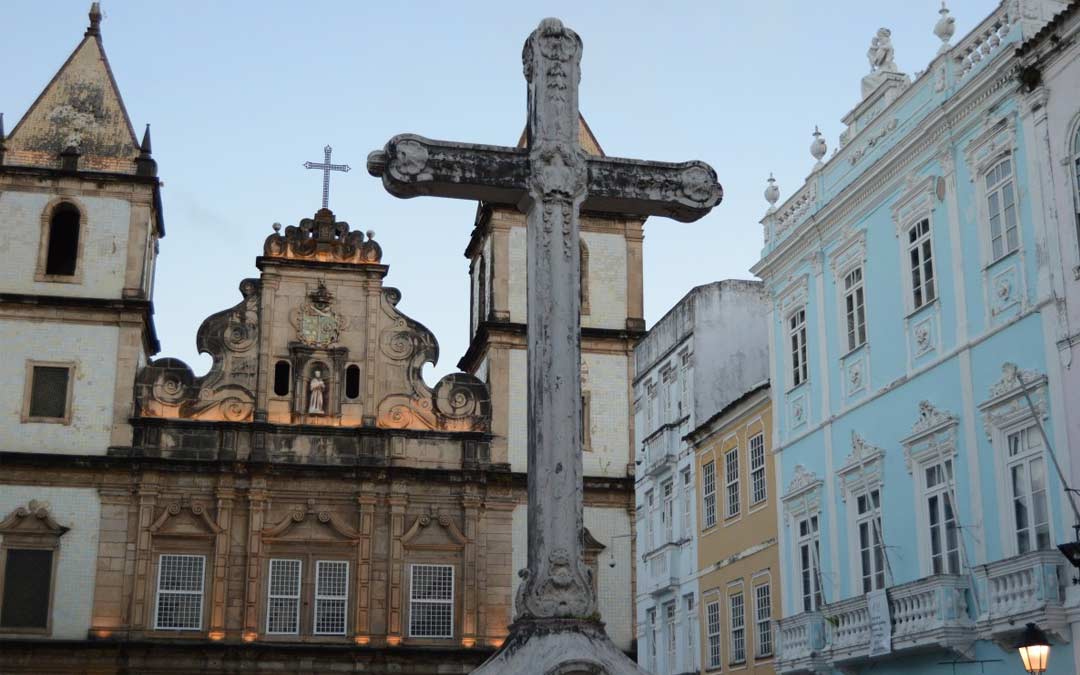 SALVADOR DE BAHIA HISTORICAL AND CULTURAL CITY TOUR
SALVADOR DE BAHIA HISTORICAL AND CULTURAL CITY TOURTake a tour through the UNESCO-declared World Heritage Site and oldest part of town, Pelourinho. Filled with gold-laden churches and strikingly-painted Baroque architecture, the 18th-century São Francisco Church and Convent is a must-see, while the Afro-Brazilian Museum provides insight into the city’s cosmopolitan cultural heritage. End a busy day sightseeing and visit the restored art deco Elevador Lacerda for a breathtaking view of the metropolis.
-
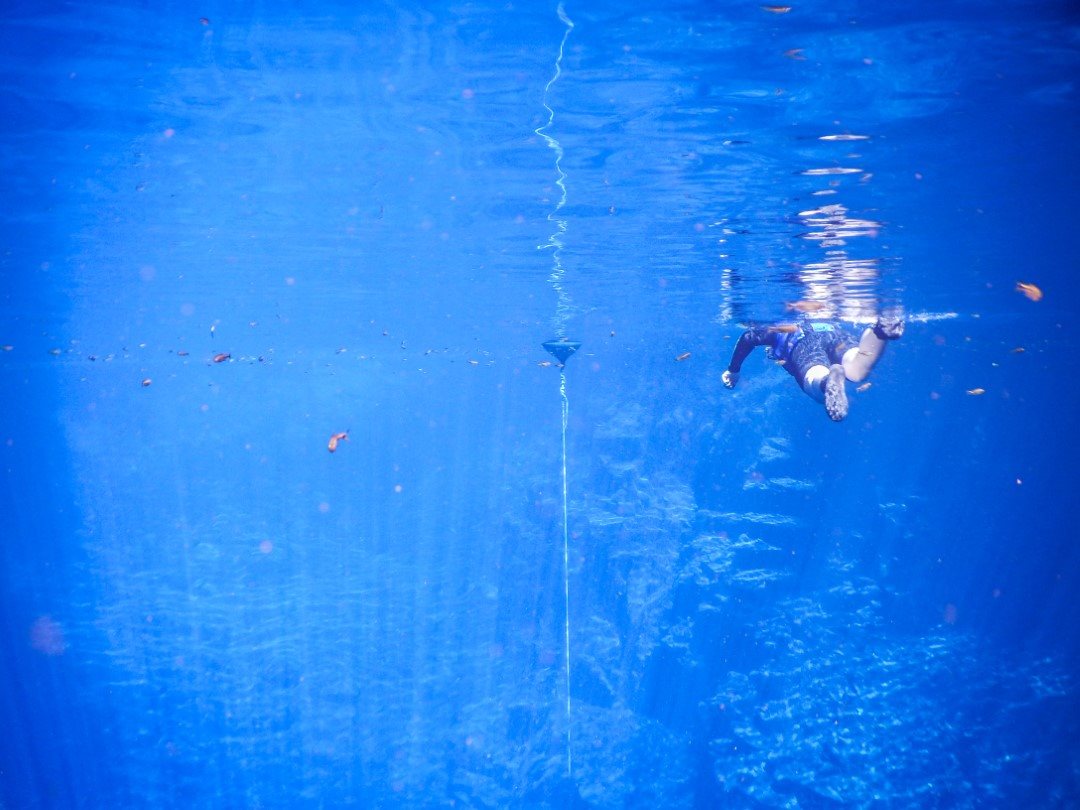 SCUBA, SNORKELING AND WATER SPORTS
SCUBA, SNORKELING AND WATER SPORTSSalvador de Bahia is a watersport fanatic paradise. Cruise from island to island in Baía de Todos os Santos, ride waves on kiteboards at Praia do Porto, scuba dive near 18th-century shipwrecks at one of Brazil’s most significant underwater archaeological sites Banco da Panela or explore marine life living on offshore reefs. Beach culture is big in Brazil and at Salvador de Bahia there are suitable shores for both beginner and advanced watersport seekers.
-
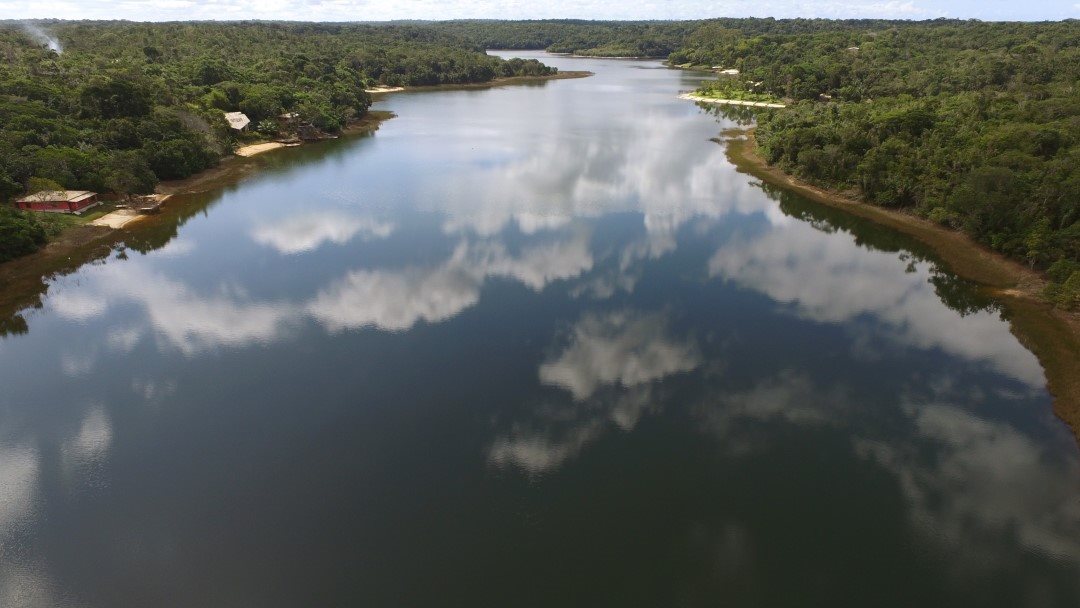 BOAT TRIP UP THE RIVER TO THE SAPIRANGA NATURE RESERVE
BOAT TRIP UP THE RIVER TO THE SAPIRANGA NATURE RESERVEEscape the city and travel 51 miles up Salvador de Bahia's east coast to explore 1,482 acres of protected Atlantic Forest bursting with exquisite orchids, exotic bromeliad plants and mesmerising butterflies. Hire bikes and buggies to cover more ground and visit hidden waterfalls or kayak on the Rio Pojuca, which flows through the park, while observing over 180 native birds, anteaters, sloths and monkeys along the reserve’s riverbanks.
-
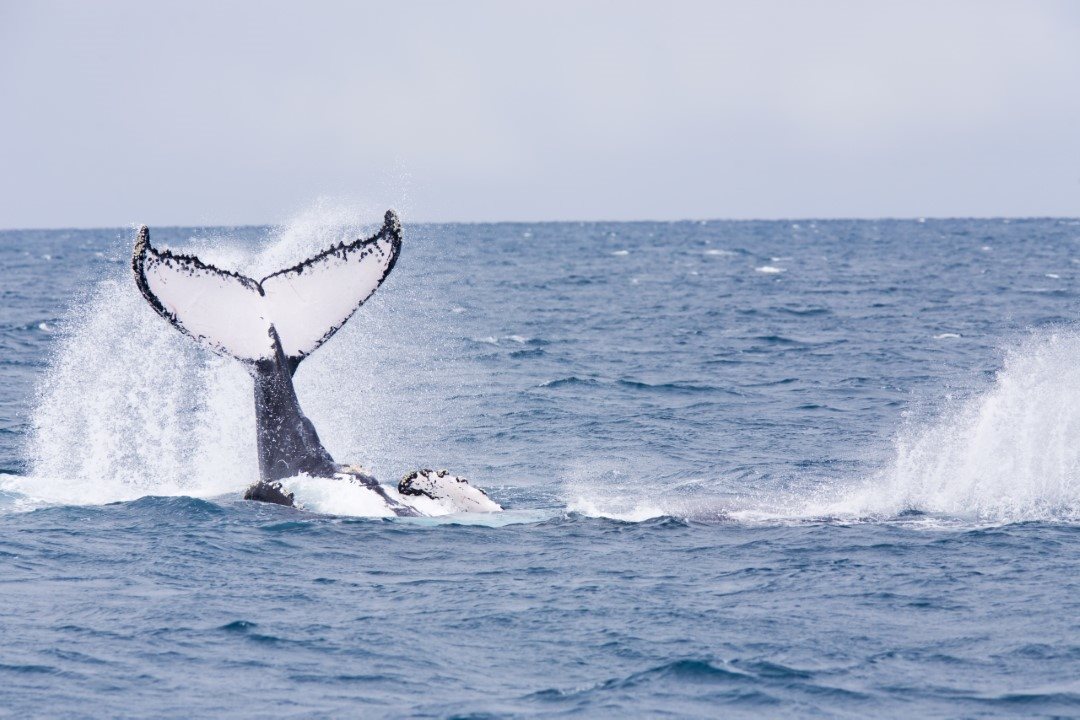 WHALE WATCHING AT ALL SAINTS BAY
WHALE WATCHING AT ALL SAINTS BAYTaking a day-tour to watch the earth’s largest mammals frolick in waves at the Bay of All Saints is one of the best things to in Salvador de Bahia. Every year, approximately 15 000 whales migrate from the across the Atlantic Ocean from their warm breeding grounds in the Caribbean to their colder feeding grounds in Arctic waters. During this season, whale watching enthusiasts can experience intimate encounters with these majestic sea creatures as they make their way north.
-
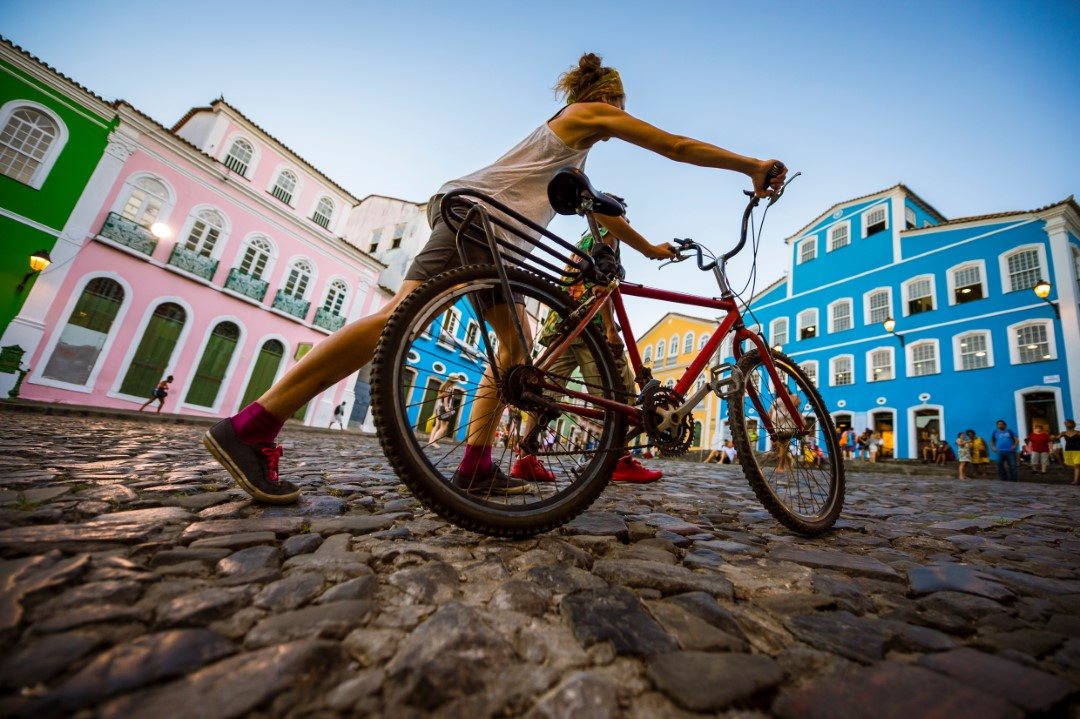 EXPLORE BEACHES AND REMOTE IMBIRIBAS ON HORSEBACK
EXPLORE BEACHES AND REMOTE IMBIRIBAS ON HORSEBACKBahia’s verdant rainforests and white, sandy beaches with picture-perfect coves are beautiful settings for single-day or overnight horse riding adventures. Saddle up and trot along its scenic coastlines traveling to places such as the isolated, mangrove-surrounded village of Caraíva or adventure to the outskirts of town and visit the native Indian Imbiriba.
-
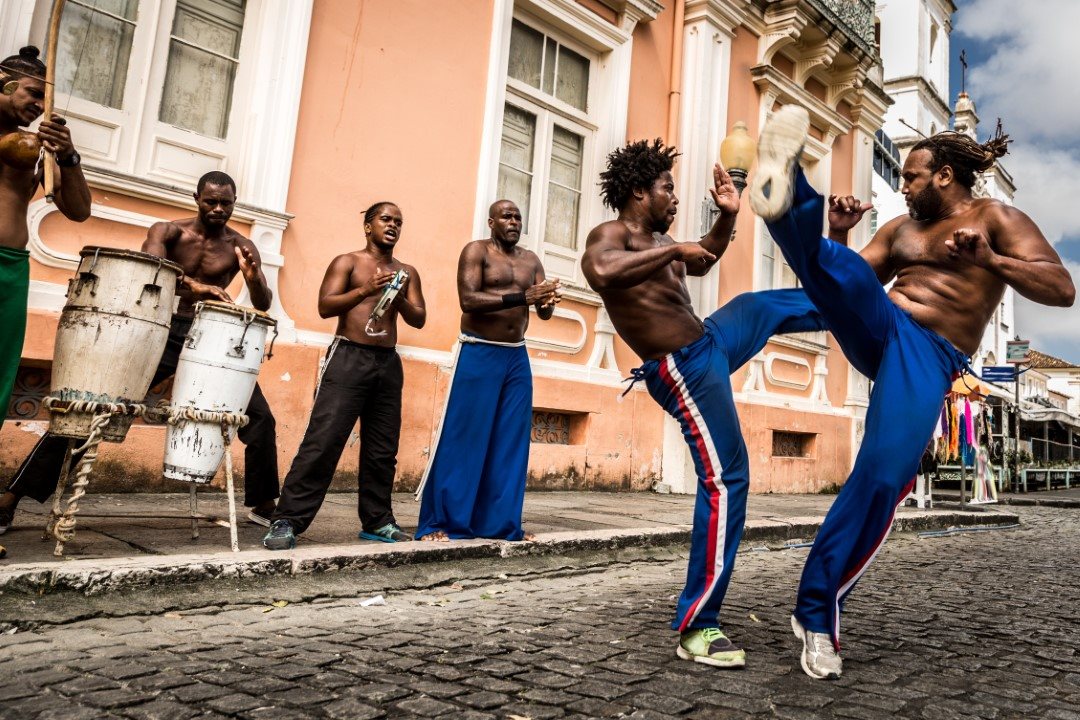 CONNECT WITH LOCAL TRADITIONS AND TRY CAPOEIRA CLASSES
CONNECT WITH LOCAL TRADITIONS AND TRY CAPOEIRA CLASSESConsidered an intangible cultural heritage of Brazil, capoeira is a martial art that was initially developed by west African slaves and is sometimes practised by groups in the streets of Salvador de Bahia. It’s highly energetic and combines music, freestyle dance, and elements of acrobatics. Find out where the nearest class is to experience the link between the spirit and the body, while moving to music from traditional bateria instruments such as the berimbaus, pandeiros and atabaque.
- Don’t swim if a red flag is flying. In specific areas, Salvador de Bahia’s beaches have strong, dangerous currents.
- Drink purified water to avoid contracting water-borne diseases.
- When shopping in Salvador de Bahia, carry a fair amount of 10 and 20 Reals banknotes. This makes it easier for small vendors and stalls to provide you with change.
- To avoid theft, only take a small bag with absolute necessities and leave valuables at your accommodation
- Wash hands or clean them with sanitizer before eating to kill germs.
- Bargaining is practiced widely at local markets, but it's up to the buyer to begin negotiations.
- Contrary to popular belief, only designated beaches allow topless women.
- Drink alcohol in moderation and stay dehydrated, especially when in the sun.
- Always look around before purchasing to find out the average price of goods before buying.
- Using beach towels is a no-go for Brazilians, rather opt for sarongs called cangas.
- Stay away from shellfish, fruit, and vegetables that have been left in the open.
- When in street markets, always keep a firm eye on your belongings and use discretion when dealing with banknotes so as not to attract the attention of petty thieves.
- Don’t take food to the beach
- Always wash and peel fresh fruit and vegetables before eating.
- When visiting busy city markets, don’t walk around with expensive-looking jewelry.
- Don’t eat unpasteurized dairy products
- Use ATMs inside banks, rather than freestanding machines which are more susceptible to fraud.
-
-
WHAT ARE THE BEST THINGS TO DO IN SALVADOR DE BAHIA?
Shopping in Salvador de Bahia is a bargain hunter's paradise. From ubiquitous ceramic statues of Brazilian women to Catholic and Candomblé religious relics, capoeira instruments and intricate, white-lace garments, its souvenirs serve a mix of functional and decorative purposes. Wondering what to buy in Salvador de Bahia? Handmade ceramics such as pots and bowls are a specialty in the Bahia region as are their Divino de Espirito Santo dove symbols, which in the old days, were placed above doorways to ensure protection and peace. In addition, their colorful, wish-making Fitinhas do Senhor do Bonfim ribbons - tied around the wearer’s wrist until they fall off, make lovely gifts because they’re small and easily transportable.
-
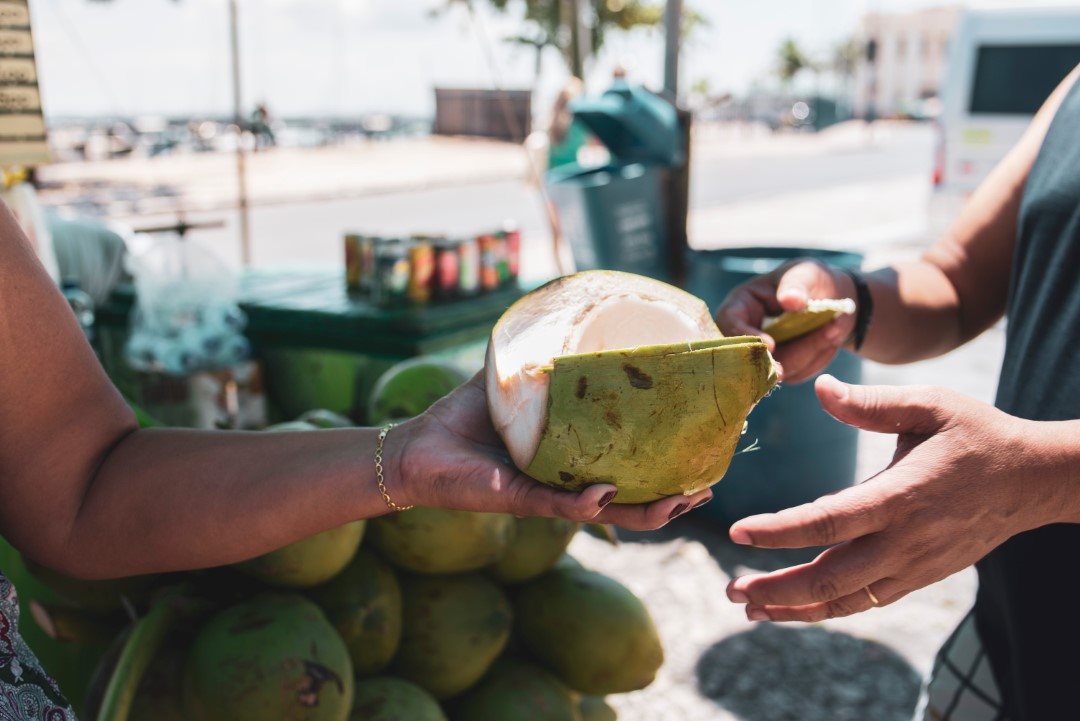 WHERE TO SHOP IN SALVADOR DE BAHIA
WHERE TO SHOP IN SALVADOR DE BAHIAThe historic cobblestone district known as Old Town wherein resides the Mercado Modelo is the most renowned area to buy traditional souvenirs in Salvador de Bahia, while the Instituto de Artesanato Visconde de Mauá sells high-quality artisanal goods. Feira de São Joaquim and Rio Vermelho also offer a range of contemporary products, and the beachfront remains the best place to buy ever-popular kangas.
-
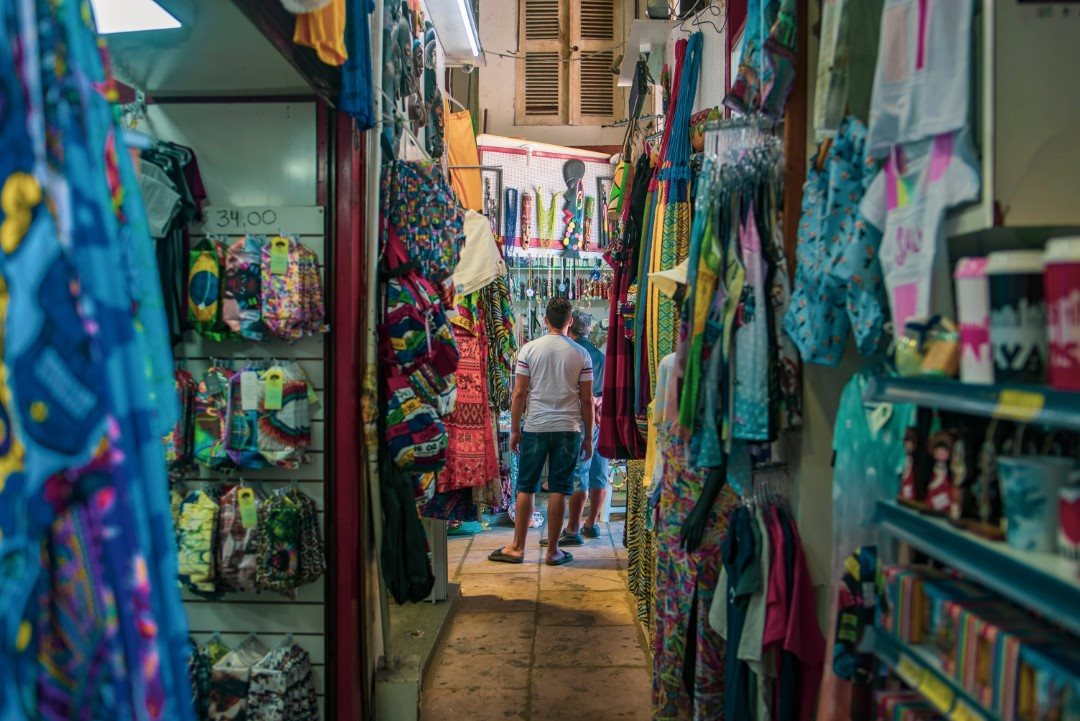 MERCADO MODELO
MERCADO MODELOPositioned in an 1800s, two-story building downtown that was once the site where slaves were sold, Mercado Modelo is one of the oldest and most traditional markets to buy Salvador de Bahia souvenirs. With over 250 stalls, visitors can purchase religious, good-luck trinkets such as Senhor do Bonfirm ribbons, single-string, percussion instruments such as the berimbau and popular Afro-Brazilian amulets called penca de balangandã.
-
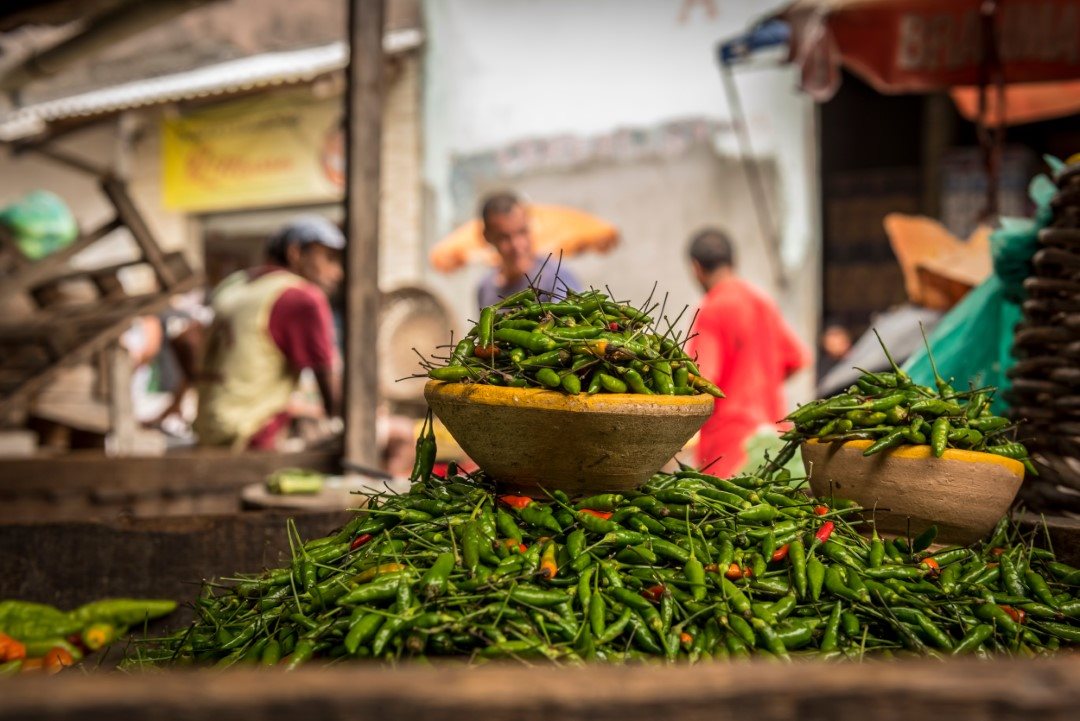 OLD TOWN
OLD TOWNWander through streets filled with small stalls and shops open throughout the day in the heart of Salvador de Bahia’s historic district Pelourinho. This region is famous for its traditional wooden dove carvings, Bahian art, and intricate Bahian lace garments.
-
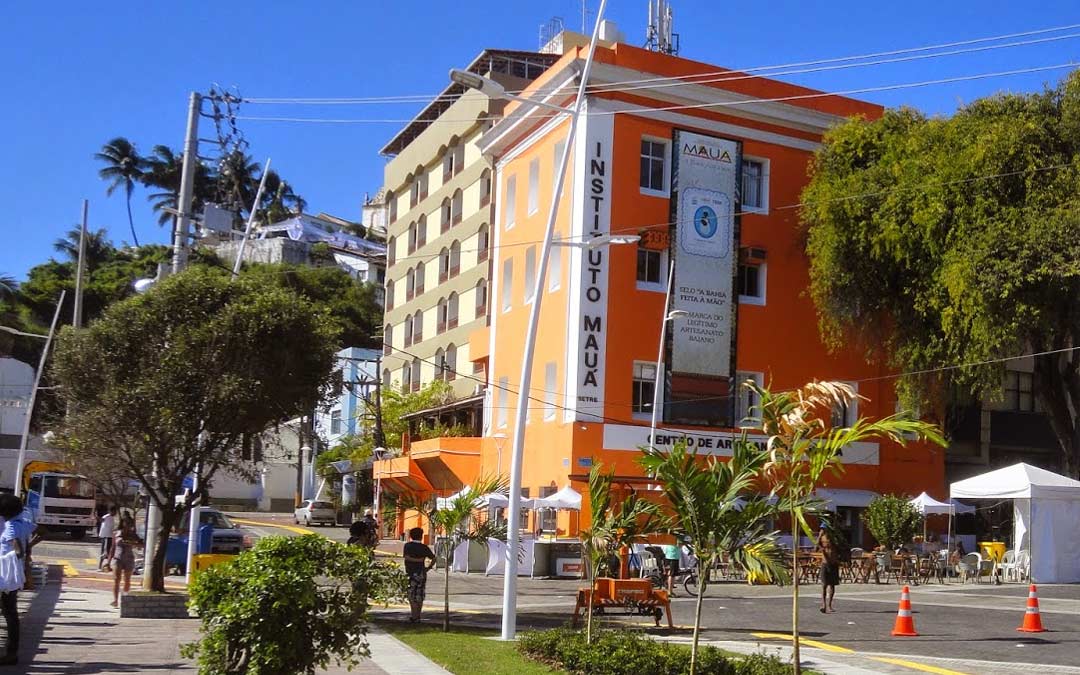 INSTITUTO DE ARTESANATO VISCONDE DE MAUÁ
INSTITUTO DE ARTESANATO VISCONDE DE MAUÁLinked to the government of Bahia, this state-funded institute operates as a training center with the aim of preserving traditional craftsmanship in Bahia and greater Brazil. Watch artists in learning, before buying unique handcrafted ceramics, detailed woodcarvings, useful woven baskets and expressive clay sculptures at their store.
-
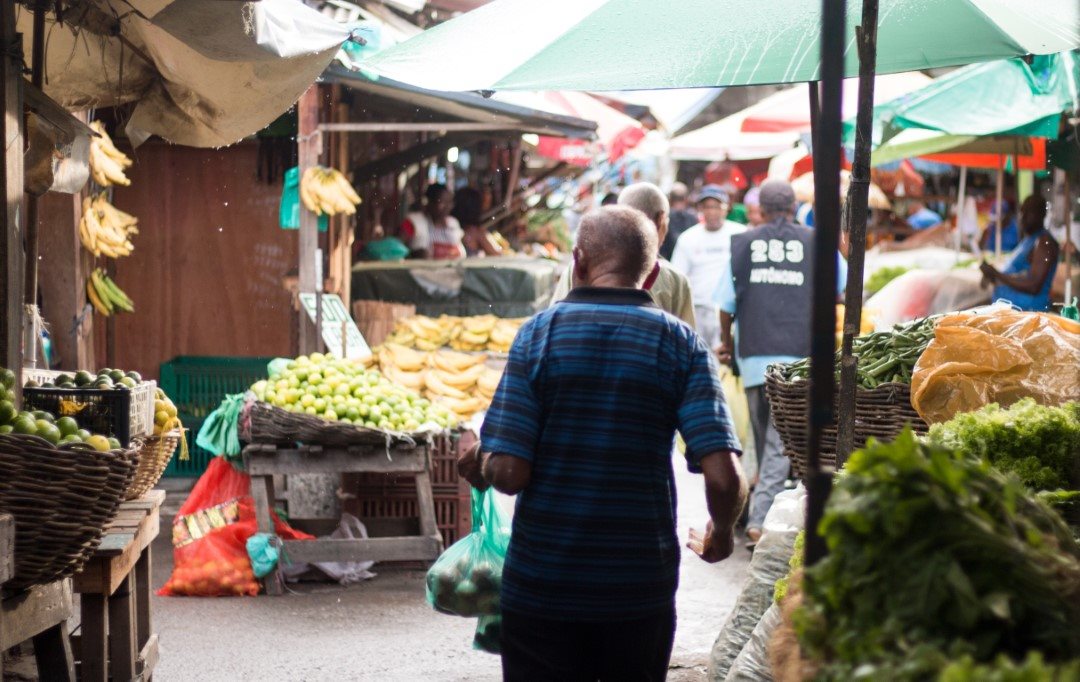 FEIRA DE SÃO JOAQUIM
FEIRA DE SÃO JOAQUIMThis large outdoor bazaar in Calçada, located by the city's commerce district, is open seven days a week. It sells a wide variety of merchandise from rolls of strong tobacco to religious candomblé trinkets, handmade ceramics, colorful beads and artisanal wooden spoons.
-
 RIO VERMELHO
RIO VERMELHOLocated in the southern zone of Salvador de Bahia, this boho district has many stores selling retro and vintage paraphernalia as well as an abundance of local labels clothing and shoes. It's perfect for visitors looking to buy gifts with a contemporary twist when shopping in Salvador de Bahia.
-
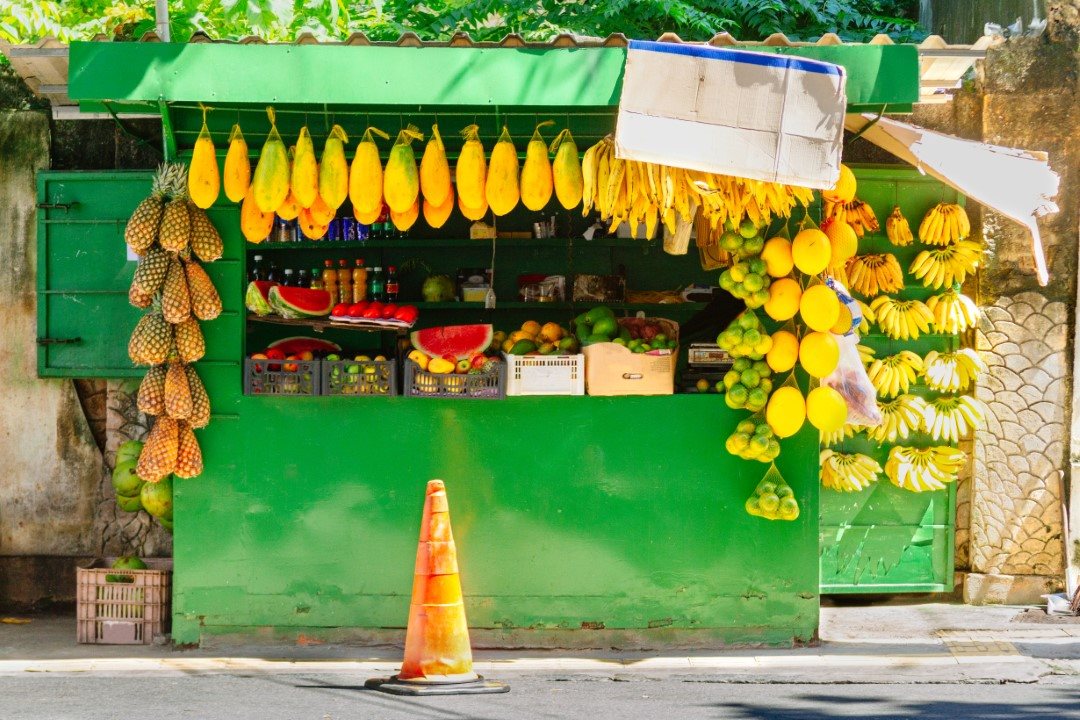 ON THE BEACH
ON THE BEACHDon’t waste time looking for beach souvenirs in malls. Nearly every famous shoreline has vendors selling beaded jewelry, itsy-bitsy bikinis, sandals and cangas - Brazil’s signature beach accessories. Usually cheap, and multifunctional, cangas are beach must-haves and make excellent, functional gifts to take back home.
- Don’t swim if a red flag is flying. In specific areas, Salvador de Bahia’s beaches have strong, dangerous currents.
- Drink purified water to avoid contracting water-borne diseases.
- When shopping in Salvador de Bahia, carry a fair amount of 10 and 20 Reals banknotes. This makes it easier for small vendors and stalls to provide you with change.
- To avoid theft, only take a small bag with absolute necessities and leave valuables at your accommodation
- Wash hands or clean them with sanitizer before eating to kill germs.
- Bargaining is practiced widely at local markets, but it's up to the buyer to begin negotiations.
- Contrary to popular belief, only designated beaches allow topless women.
- Drink alcohol in moderation and stay dehydrated, especially when in the sun.
- Always look around before purchasing to find out the average price of goods before buying.
- Using beach towels is a no-go for Brazilians, rather opt for sarongs called cangas.
- Stay away from shellfish, fruit, and vegetables that have been left in the open.
- When in street markets, always keep a firm eye on your belongings and use discretion when dealing with banknotes so as not to attract the attention of petty thieves.
- Don’t take food to the beach
- Always wash and peel fresh fruit and vegetables before eating.
- When visiting busy city markets, don’t walk around with expensive-looking jewelry.
- Don’t eat unpasteurized dairy products
- Use ATMs inside banks, rather than freestanding machines which are more susceptible to fraud.
-

